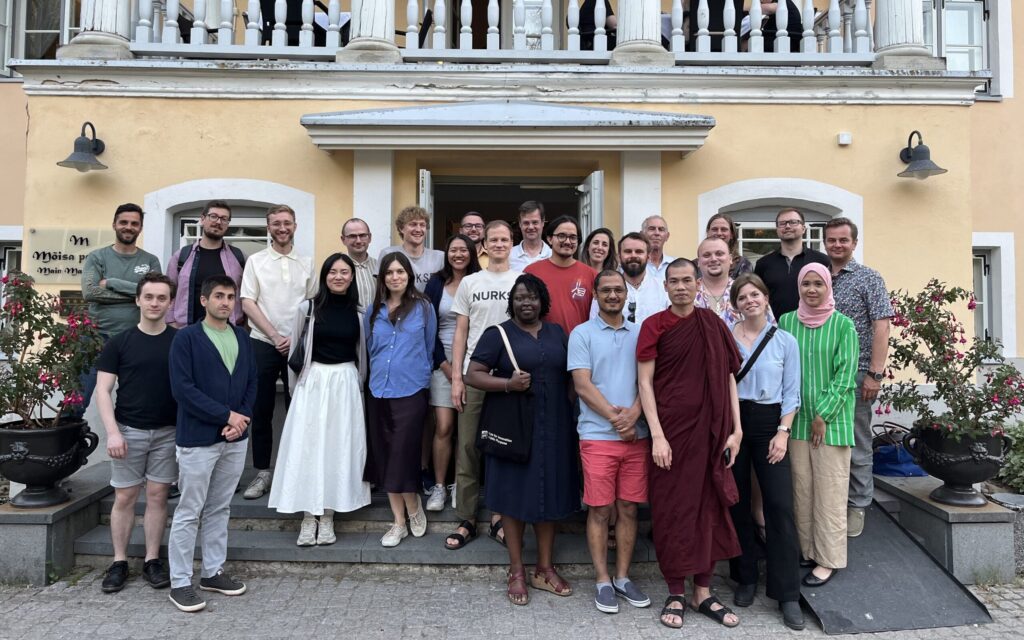We’re thrilled to share the highlights of the first-ever PADST Summer School, which took place in the serene surroundings of Vihula Manor from June 19th to June 21st. The event brought together twenty early-career researchers from diverse backgrounds, all eager to delve into the fascinating intersections of public administration, digitalization, and sustainability.

The primary goal of this summer school was to ignite compelling discussions and debates on these critical topics. Participants had the unique opportunity to engage with renowned scholars and experts in the field, sharing their own research projects and receiving invaluable feedback and guidance.
Insights from Distinguished Speakers
The event featured a lineup of distinguished speakers, including Vasilis Kostakis, Louis Meuleman, and David Eaves, who explored subjects ranging from addressing inequality and ecological crises to the importance of digital public infrastructure for sustainability.
- Wolfgang Drechsler’s Lecture: Professor Wolfgang Drechsler, from TalTech, illuminated the intersection of Public Administration (PA), Information and Communication Technology (ICT), and Sustainability. His thought-provoking presentation delved into the concept of materialism in economics. He stressed the necessity of embracing local, human-centered approaches while establishing boundaries for progress. Professor Drechsler also tackled the challenges posed by the digital capacity of the public sector and how to harness technology effectively without succumbing to its control.
- Urmet Lee’s Insights: Urmet Lee, the Director General of Statistics Estonia, passionately addressed the pressing need for complementary actions in the green transition. He highlighted the role of governments in leading long-term commitments but acknowledged hurdles like economic, political, and regulatory challenges. Lee emphasized the significance of Sustainable Development Goals and the planetary boundaries model in guiding environmental management. He even presented a study on the role of local governments in this transition, suggesting a monitoring system and sustainable development indicators. Integrated data and the challenges faced by the European Statistical System also took the spotlight.
- Louis Meuleman’s Vision: Louis Meuleman, Visiting Professor at Leuven University and Vice-chair of the United Nations Committee of Experts on Public Administration, commenced the day with a presentation on “Metagovernance for Sustainability: Coping in an Unpredictable World.” He introduced metagovernance as a framework for effective governance, highlighting its relevance to current EU and UN affairs. The discussion zoomed in on metagovernance for sustainability, addressing the interplay between science, policy, and society. Key takeaways stressed the importance of governance in achieving Sustainable Development Goals (SDGs) and the need for policy coherence.
- David Eaves’ Insights: David Eaves, Associate Professor of Digital Government at UCL, delved into the Digital Public Infrastructure. He argued for a fresh approach to fund digital government efficiently. Eaves’ presentation underscored global government IT spending, challenges linked to duplication and lack of standards, and the pivotal role of digital public infrastructure in sustainability.
- Dr. Kate Roll’s Perspective: Dr. Kate Roll (UCL) examined the anti-politics regime surrounding the Sustainable Development Goals (SDGs) in the UK. Her talk honed in on the confluence of development, business, data, and technology. It shed light on the role of national statistics bodies in SDG implementation, the hurdles related to data use and reporting, and the dearth of political action on SDGs.
- Lauri Tammiste’s Insights: Lauri Tammiste, representing the Stockholm Environmental Institute/Estonian Government Working Group on Green Transition, set the tone for the third day. His lecture echoed key conclusions and recommendations, emphasizing the need for an effective governance system in the green transition. Key suggestions encompassed implementing green budgeting principles, prioritizing high-impact areas, promoting sustainable mobility, enhancing waste management, supporting circular economy practices, and strengthening the producer responsibility system. The lecture celebrated the pivotal role of leadership, collaboration, and creating an attractive framework for private sector investment in the green transition. It also highlighted the positive impact of direct engagement with government officials.
Parallel Sessions and Presentations
Participants actively contributed to the discussions through presentations and discussions in parallel sessions, covering topics like green transition, public administration capacities, and the challenges of digital governance. Session I, chaired by Kate Roll (UCL), featured presentations by Sara Thabit (TalTech), Peeter Vihma (TalTech), Caterina Santoro (KU Leuven), and Nadia Monira Mohamed Taib (UCL). Session II, under the guidance of Alex Pazaitis (TalTech), hosted presentations by Dominik Braun (TalTech), Nai Lee Kalema (UCL), Archer Buissink (Utrecht University), and Siqing Yu (KU Leuven).
Fireside Chat: Erkki Karo (TalTech) engaged in a late evening fireside chat with Asko Lõhmus from Tartu University. The discussion revolved around ecological perspectives on sustainability policy-making.
A Glimpse into the Future
The summer school also provided a sneak peek into our research agenda. This includes three pivotal papers focusing on the double transition of sustainability and digitalization, rethinking public administration capacities for sustainability, and a comparative empirical study at the city level.
Reflections and Collaborative Spirit
This inaugural PADST Summer School has set the stage for exciting research, collaboration, and exploration in the realms of public administration, sustainability, and digitalization. Stay tuned for more updates on our journey!
Stay engaged, follow us on LinkedIn #padstproject, @NurkseSchool @IOPGI_KULeuven @IIPP_UCL #TalTechPADST, #TwinTransition #PublicAdmin #Innovation
